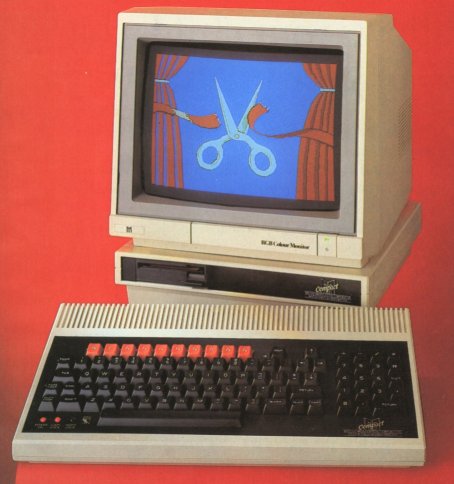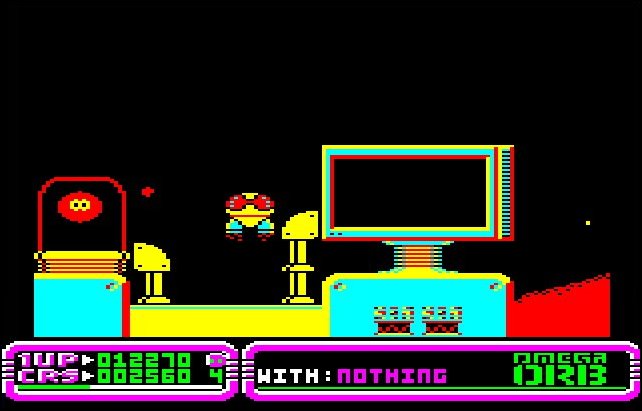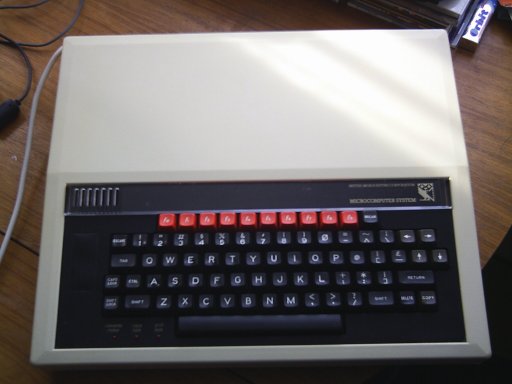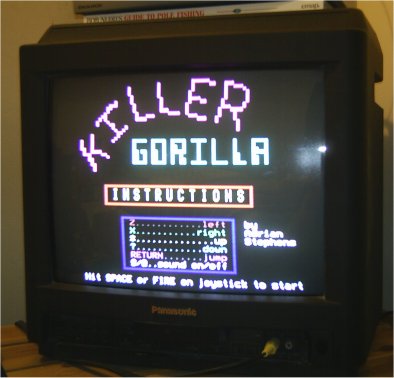Acorn Antiques ~
Where do I begin? Many moons ago in the late 1980's
Santa Claus very kindly left me an Acorn BBC Master Compact,
a three-piece outfit that in many ways resembled the desktop PC's of the
day, albeit in 8-bit 128K RAM fashion. I thought it was fantastic! Here
was a machine that was the envy of the playground, I felt special, I felt
like I could start global thermo-nuclear war in the same way David Lightman
did in the movie 'Wargames'. It was my baptism into the new religion
of home computing. For many years my Master Compact became less of a family
machine and more my own personal plaything, whilst in the mean time earning
me the respect from my peer group as I pretended to be a computer programmer.  Actually
I was quite amateur looking back, but it did help me to pass my school
GCSE's when it functioned as a word processor, graphics tool and ultimately
as a programming machine. In fact, BBC BASIC was one of its strong points
- easy to learn and well structured, its a testiment to the developers
that years later I can sit at a BBC-era machine and create programs with
relative ease, if only modern programming languages were this friendly
and straight forward.Of course things progress, and when
you're a kid
at school all you really want to do is play games and I was no
different
(Omega Orb, Labyrinth and Spellbinder spring to mind), however back in
the 1980's the price of those blue 3.5" disk games were prohibitively
expensive
being completely out of reach of my pocket money. Additionally, Acorn
Computers
really screwed up the Compact by failing to add the all important
cassette
support (a fatal mistake), so cheaper cassette based software was sadly
unavailable, but then I guess it was designed as a fancy home-office
machine.
Despite the cost of software the games were thankfully pretty good,
let's
face it Elite is often voted the best game ever released so it was a
great
gaming platform in that respect, however it wasn't long before I ended
up joining my classmates into the world of Sinclair computing (via a 1k
ZX81, a rubber keyed Spectrum 48k and finally a 128k +2 variant). The
cassette
based games were far cheaper and easily obtained thanks to classmates
keen
to borrow or copy items, and if I dare admit it the magazines were far
more entertaining to read but then I did fancy one of the editors
(cheers
Your Sinclair!). Acorns were more expensive than Sinclairs and this
often
led to the unfair stigma of being a middle class educational tool
thanks
to their widespread integration into schools and academic institutions,
at least that was my take on things. Sinclair machines (and to a
smaller
extent Commordore 64's) were far more common thanks to their lower cost
and cheaper software, games were literally everywhere, so it was fairly
inevitable that my gaming fix would arrive via this route. However, the
Compact was still very much the main machine, and I used it almost
daily
throughout my GCSE years for English assignments (via the wonders of
VIEW)
and for programming exploits. To this end, I can't thank my parents
enough
for investing in such a versatile machine. I'll always remember an
early pre-GCSE assignment in which we had to create a 'club' or
something and make a poster etc, 'The Flashing Blades' (a title ripped
off a dubbed television programme at the time) served as our name and
to go along with it I presented a floppy disk containing our club
details. Given that my school at the time didn't even have a 3.5" drive
to view the material - thank god (which was simply a VIEW file
with our names on it plus a few other details), we ended up displaying
the disk on the wall along with the poster - something I still find
unbelievable today, that a little blue floppy disk would carry such
fascination. Actually
I was quite amateur looking back, but it did help me to pass my school
GCSE's when it functioned as a word processor, graphics tool and ultimately
as a programming machine. In fact, BBC BASIC was one of its strong points
- easy to learn and well structured, its a testiment to the developers
that years later I can sit at a BBC-era machine and create programs with
relative ease, if only modern programming languages were this friendly
and straight forward.Of course things progress, and when
you're a kid
at school all you really want to do is play games and I was no
different
(Omega Orb, Labyrinth and Spellbinder spring to mind), however back in
the 1980's the price of those blue 3.5" disk games were prohibitively
expensive
being completely out of reach of my pocket money. Additionally, Acorn
Computers
really screwed up the Compact by failing to add the all important
cassette
support (a fatal mistake), so cheaper cassette based software was sadly
unavailable, but then I guess it was designed as a fancy home-office
machine.
Despite the cost of software the games were thankfully pretty good,
let's
face it Elite is often voted the best game ever released so it was a
great
gaming platform in that respect, however it wasn't long before I ended
up joining my classmates into the world of Sinclair computing (via a 1k
ZX81, a rubber keyed Spectrum 48k and finally a 128k +2 variant). The
cassette
based games were far cheaper and easily obtained thanks to classmates
keen
to borrow or copy items, and if I dare admit it the magazines were far
more entertaining to read but then I did fancy one of the editors
(cheers
Your Sinclair!). Acorns were more expensive than Sinclairs and this
often
led to the unfair stigma of being a middle class educational tool
thanks
to their widespread integration into schools and academic institutions,
at least that was my take on things. Sinclair machines (and to a
smaller
extent Commordore 64's) were far more common thanks to their lower cost
and cheaper software, games were literally everywhere, so it was fairly
inevitable that my gaming fix would arrive via this route. However, the
Compact was still very much the main machine, and I used it almost
daily
throughout my GCSE years for English assignments (via the wonders of
VIEW)
and for programming exploits. To this end, I can't thank my parents
enough
for investing in such a versatile machine. I'll always remember an
early pre-GCSE assignment in which we had to create a 'club' or
something and make a poster etc, 'The Flashing Blades' (a title ripped
off a dubbed television programme at the time) served as our name and
to go along with it I presented a floppy disk containing our club
details. Given that my school at the time didn't even have a 3.5" drive
to view the material - thank god (which was simply a VIEW file
with our names on it plus a few other details), we ended up displaying
the disk on the wall along with the poster - something I still find
unbelievable today, that a little blue floppy disk would carry such
fascination.
My Grammar school's very own Compact unwittingly became
something of a games machine itself, when my copy of Crazee Rider was used
to entice people to get the highest score at a fund raising event! Incidentally
I secretly played and got the highscore, partly because I'd bought the
main prize (some kingsize Mars bars if I recall directly) but mainly because
the winner would have been a smug git from my year group. I found out he
also owned a copy of the game for his Acorn Electron at home (something
I hadn't anticipated) - so there was no way I was going to let him win! But
the money went to a good cause, and I like to think my game competition
was a far better thing to spend your 50p on compared to the other rubbish
that was on offer, such as getting your palm read by yet another
idiot from my year group (although I was in love with his blonde assistant
at the time). Well, it was the Adrian Mole years of my life...
The Compact was still used in the background but
as I got older a 16-bit Atari (a 512k STE) took over the role of word processor
and games machine. Interestingly, it was around this time that my school
also began to augment their 8-bit systems (much abused BBC Model B's) but
with Acorn's new Archimedes range of computers (two rooms worth if I remember
correctly), and lets face it everybody liked that pretty front end Graphical
User Interface (GUI) especially when we all got to play 'Lander' during
wet dinner breaks. I was certainly glad Acorn included !65Host, a BBC BASIC
emulator, as this enabled me to create maths coursework programs at home
on the Compact and then load them easily with the emulator at school -
finally those 3.5" disks came in handy!
University beckoned and ultimately PC clones came
to rule the roost, but sadly despite trying to pass it on to younger members
of the family the Compact was eventually 'disposed of' to the great computer
heaven in the sky. How I was ever talked in to this remains a mystery,
and even today I feel terribly guilty about it - and that's pretty embarassing
to admit in a nerdy way. It was during these cold university years that
I was introduced to the Internet and discovered the wealth of information
that lay out there on the BBC Micro and its variants. I was hooked again!
It didn't take me long before I was hankering after my old computer or
better still the models I really wanted to own, such as a Master 128 or
even a Model B, which lets face it - the latter I'd been using ever since
I started primary school. It's only now that I understand why people crave
things they had in their youth such as Mechano kits or Hornby steam engines.
It's a comfort thing, like having a pair of arms around your childhood again.
I now own several BBC microcomputers, and in many
ways I honestly think its turned into a mini obsession, not helped by the
delights of eBay tempting its treasures at me. Its quite sad to admit and
I'm sure many people think its geeky - but as a self confessed anorak I
don't really care, one thing's for sure - I'm not the first and I won't
be the last one who sings the praises of these little micros, they helped
create the computer industry we know today.
Retro-realism
However, it has to be said that unless you have
a spare room in your house or a garage/shed in which you can safely keep
your collection, the realisation of what you're buying becomes alarmingly
apparent. Compusively buying the odd BBC item can often lead to one of
the main reasons why people got rid of them in the first place - lack
of room!
Incidentally, although its very easy to be romantic
about these machines, actually owning one again quickly reveals just how
limited they are today; I've lost count of the amount of times people have
said to me "What on earth do you want that for, what are you going to
do with it?". That's not being dismissive of old computers, its being
realistic, particularly when you've got three others tucked under the bed
and one in the cupboard! If you've got the software and space to use them
then go for it, they deserve to be used, but it wouldn't surprise me if
most come out on the odd rainy day and then sit in the loft for the rest
of the year :) We all do it. The other thing which I have to mention is
reliability and parts, Acorn computers have a reputation for reliability
and that's true in most cases - but at this stage in the game don't be
surprised if some keys stick and finding replacement ROMs can be difficult.
Don't even get me started on those damn Master 128 battery packs! Oh and
whilst we're at it, you will inevitably break those little plastic guide
tabs inside the lid of the Master 128 case....
To be honest, there's no way a BBC Micro will be
anywhere near as useful as a modern day computer, that's a given and not
a fair comparison, we're talking 1986 technology at the latest. However
they can still be useful, particularly for hardware projects, simple programming
and if you really need it a basic word processor, it got me through my
GCSEs which says something :) Of course the games were great, and for many
people that's all that encouragement they need to buy one again...or if
you can't quite stretch to the real thing, there's several emulators out
there.
My collection
I
won't lie, having a working BBC system at hand is good fun, but having
a small room with BBC's emerging from the undergrowth can get too much.
I've had several (and I mean several) BBC's over the last few years
as I'm always on the search for a well preserved machine. These days I'm
glad to say that my obsession has been temporarily restrained until I relocate
to a bigger house, besides which my passion for angling paraphernalia and guitar parts has
curbed the spending. However as you've read this far - below is a listing
of my current collection:
BBC Model B, 8721 DFS, Issue 3(?)
I bought this machine back in 1999/2000, my first
introduction back into the realm of the BBC Micro, its a bit yellow and
I'm not sure whether to keep this one, has rare factory fitted DFS. Open
to offers...
BBC Model B, Issue 7
Minty fresh, unyellowed, unmarked - definitely
a keeper, came with its polystyrene outer protectors. It doesn't have DFS
but I'll probably keep it original.
BBC Model B, 8721 DFS, Issue 7
Nice and clean working BBC, great little machine.
Wanted!
Well, although I toy with the idea of owning a
well kept BBC Master Compact again - these days I tend to find myself searching
for mint/excellent BBC Model B+ machines (64k or 128k), as I find these provide
a stronger signal (and thus better screen resolution) with conventional
televisions when a monitor is not available. So if you have one in good
condition then send me an email...
_________________________________
Website
contents @ Aaron Littlefield
2010
www.aaronlittlefield.com
|